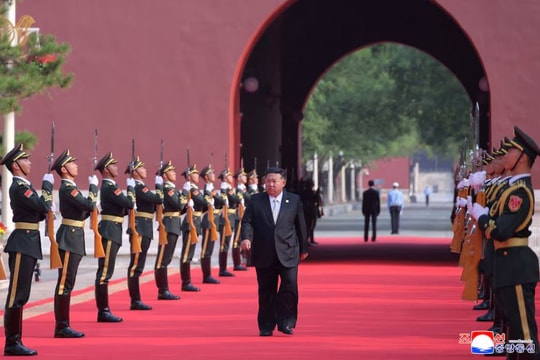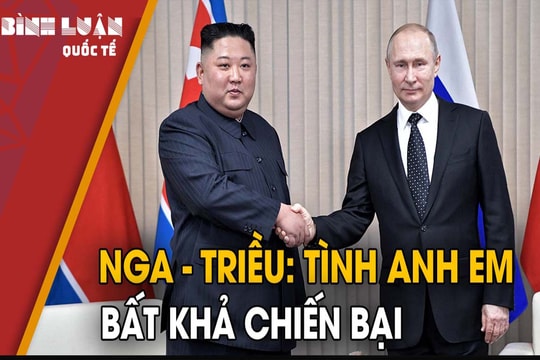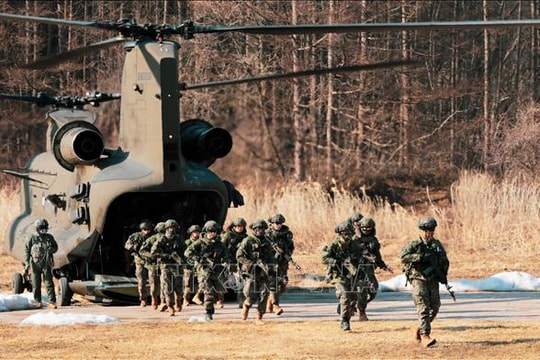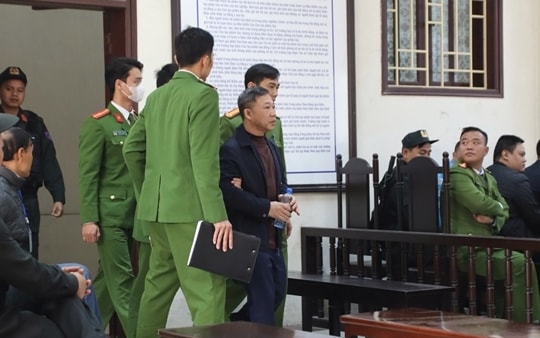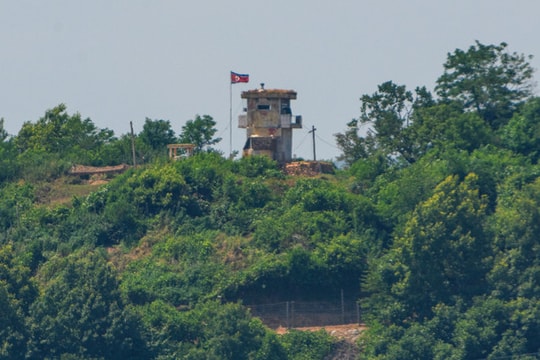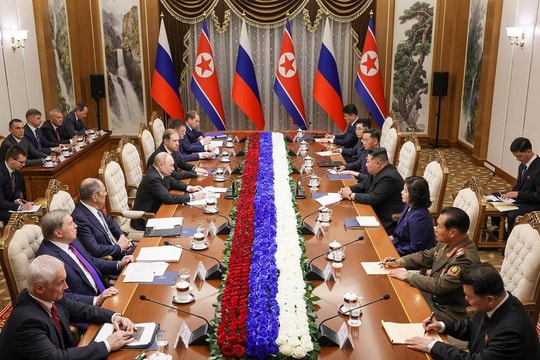Three ways the US can handle the North Korea crisis without gunfire
Building deterrence, reducing dependence on China or negotiating are ways the US should apply to handle the North Korea crisis.
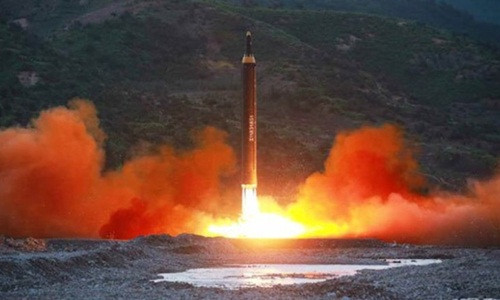 |
A North Korean missile test launch. Photo: Rodong Sinmun. |
If the US attacks North Korea, the world may witness another nuclear war. So far, dialogue has not worked and China has not helped much to resolve the crisis on the Korean peninsula.
The above facts, along with the fact that North Korea is accelerating the development of missiles capable of reaching the US mainland, make many people shudder with fear, according to AP.
However, Washington is not out of options. It still has other ways to deal with the situation, none of which require guns or missiles.
Building deterrence
Building deterrence is essentially about ensuring that an adversary has no viable military options at its disposal. North Korean leader Kim Jong-un has done a pretty good job of this.
Vipin Narang, a nuclear strategy and non-proliferation expert at the Massachusetts Institute of Technology, said US lawmakers now need to change their thinking.
“To say that the nuclear program does not add to or improve North Korea’s deterrence capability… is simply to deny reality and bury our heads in the sand,” Narang stressed. But deterrence is also a “game” that the US is very familiar with.
“We know how to do it,” he said. “We did it with China and the Soviet Union, and we reassured West Germany and Europe during the Cold War. There’s no reason we can’t do it with North Korea. Kim is not crazy or irrational, so he will respond based on domestic and strategic objectives.”
For effective deterrence, according to Narang, the US must add two missing elements: A consistent, unified message to Pyongyang from the Donald Trump administration and a strong, credible commitment to its allies in the region.
In addition to deterring attacks from the United States, North Korea’s nuclear and missile tests are also aimed at driving a wedge between the United States, Japan, South Korea, and even China, although Beijing is not Washington’s ally. If the United States’ ability to handle the North Korean problem is questioned, South Korea and Japan will certainly face pressure to find independent strategies to deal with it, even considering developing nuclear weapons on their own.
Moreover, with the US recently sending inconsistent messages on the North Korea issue, Pyongyang has more reason to speed up to gain bargaining power over Washington and at the same time strengthen its capabilities.
"As long as disagreements exist, it is difficult to build a clear and effective deterrence posture," Mr. Narang commented. "At this time, we should still keep negotiation channels open while building deterrence capabilities and reassuring allies."
On the other hand, according to Mr. Narang, US President Donald Trump should also tone down his tweets. "When President Trump tweeted that South Korea should stop 'compromising' with North Korea, Pyongyang probably felt nothing but joy because their strategy had worked."
Not dependent on China
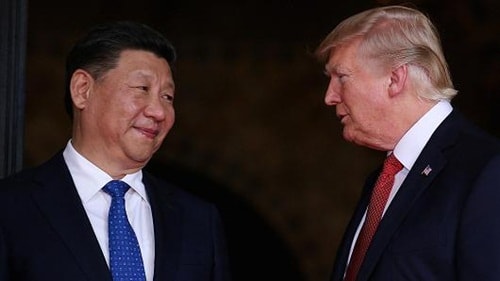 |
US President Donald Trump (right) welcomes Chinese President Xi Jinping at the Mar-a-Lago resort in Florida in April. Photo: Reuters. |
Previous efforts to force Pyongyang to abandon its nuclear weapons program have relied heavily on China and Russia to impose sanctions or exert political pressure on North Korea. The US president appears to be a big supporter of this approach. Shortly after North Korea tested a nuclear device on September 3, Trump tweeted that Pyongyang “has become a great threat and embarrassment to China, which is trying to help but with little success.”
But China and Russia’s national interests are not the same as the US’s. According to Joel Wit, an expert at the Johns Hopkins School of Advanced International Studies, shifting the responsibility for finding a solution to Moscow and Beijing would cause Washington to lose some of its ability to lead and control the situation.
“At best, China could play a supporting role, both in applying pressure and in exerting diplomatic influence on North Korea,” Wit said. “But they have not and will not do what Washington wants – to solve the problem for the US through applying all-out pressure.”
Even if Beijing were to go along with the US, things would certainly not be easy, Wit assessed. "The North Koreans will not shy away and ignore an existential threat. They will respond."
According to Mr. Wit, the Trump administration “can hardly ensure a cooperative relationship” with Beijing if it insists that North Korea is China’s main problem. On the contrary, Pyongyang seems to be exploiting the deepening rift between Washington and Beijing to accelerate the development of weapons of mass destruction. Instead of pointing the finger at Beijing, Washington needs to accept the fact that the core problem lies with the United States and North Korea, not China.
Dialogue, negotiation and compromise
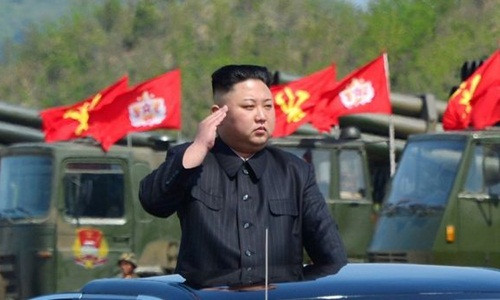 |
North Korean leader Kim Jong-un. Photo: Reuters. |
If America hopes to get what it wants, it needs to know what it wants and may have to give up something to get it, AP writer Eric Talmadge commented.
According to John Delury, associate professor of Chinese studies at Yonsei University in Seoul, South Korea, the most realistic way to resolve the crisis should follow three steps: "Dialogue, negotiation and compromise."
“Without talking to Kim Jong-un or his senior advisers, we don’t know who we’re dealing with, what their positions are, what we can give and what we can get from them. Dialogue will lead us to negotiations, short-term steps that can reduce risk, reduce hostility, and even build some trust,” Delury said.
He stressed that the US needs to be clear and specific in its position. Negotiators should focus on persuading Pyongyang to suspend nuclear and missile tests, freeze nuclear weapons production, allow nuclear inspectors back into North Korea, and increase transparency. A commitment to non-proliferation is a must.
On the other hand, the US and its allies also need to make choices. "On issues affecting US interests, the Trump administration, in close consultation with Seoul and Tokyo, must consider what they are willing to do and what they are willing to forgo," Associate Professor Delury suggested.
Pyongyang says it wants security guarantees and Washington to remove the nuclear threat it poses from the Korean Peninsula. Those are not easy demands for the US to accept. But Washington can at least consider another request from Pyongyang: to scale back or cancel annual military exercises with Seoul.
In the long term, Delury said, the US needs to directly address “the nature of the problem, focusing on political compromise” to fundamentally change the US-North Korea relationship. “Let’s call it ‘peace dialogue’ for now, until we can find a better term,” he said.
Delury said the talks "should delve into economic cooperation, because the only thing that would change the status quo and be attractive enough to Kim Jong-un is the prospect of a North Korea that is not only secure but also prosperous."
“There are no easy answers or simple solutions” to the North Korea crisis, Delury asserted. “Even if we try our best to improve the relationship, it will be a slow, long process. So it is more important than ever to be realistic in dealing with North Korea.”
According to VNE
| RELATED NEWS |
|---|

